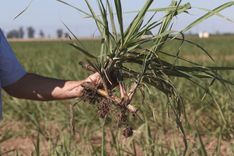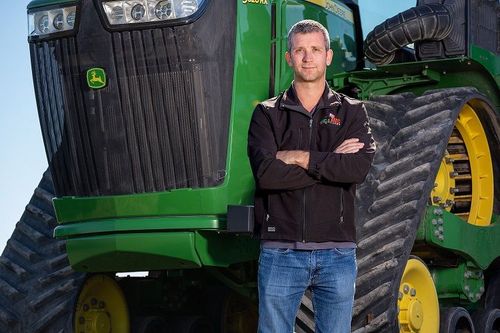Sugar Valley Energy secures crop commitments




Andrew Colace, president of AMC Farms / SOURCE: AMC Farms
June 14, 2023
BY California Ethanol + Power
Sugar Valley Energy, an advanced low-carbon sugarcane-to-ethanol and power facility, has secured letters of intent with local Imperial Valley farmers to grow 12,000 acres of sugarcane to support its initial feedstock production schedule, announced California Ethanol + Power (CE+P) President and CEO Dave Rubenstein.
“Local farmers who were interested in a profitable and stable long-term crop represented the driving force behind the Sugar Valley Energy project,” Rubenstein said. “The interest continues to be as strong in 2023 as it was in 2013 when the project was first envisioned, if not more so. We are pleased to see the overwhelming local support for an economically viable crop processed in our community for the benefit of the region’s economy and our country’s energy security.”
The sugarcane plantings will take place in phases, corresponding with the timing of construction of the facility, which will encompass an advanced bioethanol refinery producing as much as 75 million gallons annually, and a power island that will produce 43 MW of bioelectricity as well as pipeline-grade biogas. The SVE Essential Ethanol will represent the lowest carbon pathway of any commercial biofuel produced in California.
Advertisement
Advertisement
Based on the plant’s annual cycle for planting and harvest, commitments for another 38,000 acres of sugarcane will be secured to support the facility completion and commencement of operation in 2026, according to Rubenstein. Financing for the 160-acre facility and the agricultural operations is expected to be secured in 2023.
The Sugar Valley Energy growing effort is expected to support an estimated 2,000 agricultural jobs, along with approximately 200 on-site employees who will run the energy campus. The three-year construction of the project will support thousands of additional construction jobs, local economic activity as well as city and county revenue.
“The agricultural community has remained in strong support of Sugar Valley Energy and will benefit greatly from a profitable and stable crop,” said Andrew Colace, president of AMC Farms, one of the growers pledged to contract with the project. “We have analyzed the sugarcane production plans and are ready to help meet the needs of the project’s delivery schedule.”
Rubenstein noted that test crops of sugarcane are already thriving in the region. These crops have been grown for over a decade and recently were planted and managed by Stephen Benson with Benson Farms to test industry-proven varieties for their energy output and validate assumptions on required fertilizers and water for optimum growth. SVE also has contracted with U.K.-based Booker Tate Ltd., a global agribusiness consultant and renowned sugar and sugarcane refining authority, who will provide overall agronomic guidance to the farmers under contract for the project.
Advertisement
Advertisement
With approximately 500,000 acres of Imperial County farmland in active production and given the importance of agriculture and water to the region’s economy, growers in the Valley are working actively with the region’s public water agency, the Imperial Irrigation District (IID), to secure their water supply into the future. Given recent drought conditions on the Colorado River, growers such as Colace were encouraged by the recent May 2023 agreement between the Colorado River lower basin states that provides a roadmap for conservation and better clarity and confidence regarding a sustained supply. Crops such as SVE sugarcane will need to incorporate a range of established best practices to encourage maximum production and responsible water use.
Related Stories
U.S. fuel ethanol capacity fell slightly in April, while biodiesel and renewable diesel capacity held steady, according to data released by the U.S. EIA on June 30. Feedstock consumption was down when compared to the previous month.
XCF Global Inc. on July 8 provided a production update on its flagship New Rise Reno facility, underscoring that the plant has successfully produced SAF, renewable diesel, and renewable naphtha during its initial ramp-up.
The U.S. EPA on July 8 hosted virtual public hearing to gather input on the agency’s recently released proposed rule to set 2026 and 2027 RFS RVOs. Members of the biofuel industry were among those to offer testimony during the event.
The USDA’s Risk Management Agency is implementing multiple changes to the Camelina pilot insurance program for the 2026 and succeeding crop years. The changes will expand coverage options and provide greater flexibility for producers.
EcoCeres Inc. has signed a multi-year agreement to supply British Airways with sustainable aviation fuel (SAF). The fuel will be produced from 100% waste-based biomass feedstock, such as used cooking oil (UCO).
Upcoming Events










